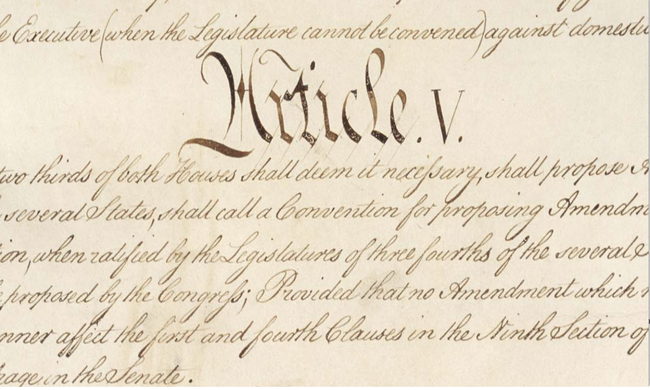A Review by Rob Natelson
Before the dramatic findings of scholarship in the early part of this century, American academics produced many articles speculating on how the Article V convention procedure was supposed to work. Some writers—mostly those hostile to the procedure—argued that Congress could and should tightly control it. They supported this conclusion with very few historical or legal precedents.
Once the new findings were published, however, most speculation was no longer fruitful. Moreover, it became very difficult to argue that Congress could dominate a process inserted into the Constitution to bypass Congress—and sold to the ratifying public on that very basis.
Recently, a Polish scholar re-examined the question of exactly what Congress’s role in the convention process is. Tomasz Wieciech of Jagiellon University in Krakow published his conclusions in an article entitled, Congress’ Obligation to Call a Convention of States under Article V of the United States Constitution (pdf). It appears in a journal called Constitutional Law Review. (I have the article, courtesy of Professor Seth Barrett Tillman, but have not been able to access the journal.)
Dr. Wieciech concludes that the role of Congress in the procedure is very limited—thereby confirming the findings of the latest wave of scholarship. Specifically, he concludes that:
- Congress may reject an application that fails as an application for formal reasons (for example, it is not adopted by a state legislature), but not for substantive reasons;
- Congress may not control the process by legislation;
- Congress may not reject unrescinded applications because they are old or because they are limited in scope.
As he accurately summarizes, “To give Congress any substantive power over the process . . .would defeat the whole purpose of an alternative and additional mode for amending the Constitution.”
Although his conclusions are well founded, the article does suffer from some shortcomings. According to the courts, historical practice is of great importance in Article V, but Dr. Wieciech includes relatively few references to historical practice. This ahistoricity sometimes misleads him. For example, he claims that most early Article V applications were unlimited, and he leaves the question open whether the states may limit a convention. In fact, however, most early Article V applications were limited in scope. (He may have been misled by Professor Charles Black’s error in this regard.) Further, pre-constitutional practice limited the scope of nearly all interstate conventions, and authoritative statements in the Founding Era record clarify that the Founders expected limited, rather than plenary, conventions to be the norm under Article V.
History is a better guide to such issues than the pre-2010 agenda-driven writings of authors who knew little about the subject.
In a footnote, Dr. Wieciech mis-characterizes something I wrote. According to his note, I said Congress is neither part of the government of the United States nor one of its departments. In fact, I said this was true when Congress acts as an independent assembly during the amendment process. In its normal legislative role, Congress certainly is part of the government and likely a “department” as the Constitution uses that word in the Necessary and Proper Clause.
Finally: From personal experience, I know that it is very hard to write flawlessly in a language that is not your first tongue. That renders it advisable to have your manuscript reviewed by a native speaker. Doing so would have prevented most of the grammatical oddities—such as the frequent omission of the definite article—that appear throughout the piece.
Nevertheless, Dr. Wieciech is to be commended for examining an important constitutional issue and arriving at generally well-based conclusions.








